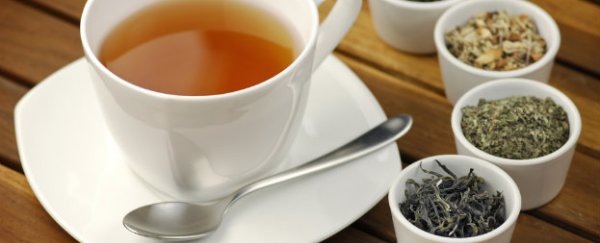If you're a tea expert, you may have noticed that sometimes your brew tastes 'different'. According to a new study, this is because shifting rain patterns affect key compounds in tea that determine its flavour.
Tea has been cultivated for centuries in Eastern cultures, and has become increasingly popular for its antioxidant properties. There are a number of major antioxidant compounds found in tea leaves that influence its taste and health properties. The concentration of secondary metabolites, which are the compounds in tea that determine its quality and health benefits, can be up to 50 percent lower following an extreme monsoon, as suggested in a study by researchers at Montana State University in the US.
The results, which are published in PLOS ONE, are based on a chemical analysis of samples of Camellia sinensis - a plant from which many popular teas, such as green tea, oolong, and black tea, are harvested. Each of these teas are processed differently to attain varying levels of oxygen, which give them their unique flavour.
The samples were taken during an extreme drought and an extreme monsoon from plantations in a small farming community in southwest China. The main trade in this community is the cultivation, processing, and sale of premium tea that is in high demand by tea traders all over the world. The team also interviewed tea farmers from the area, who reported that the tea grown in the monsoon was of a lower quality than that grown outside of the monsoon season.
With a longer rainy season as a result of climate change, a larger proportion of the annual harvest is likely to be of lower-quality. Another concern for farmers is that tea harvested in the monsoon season needs more drying, which can also reduce its antioxidant properties.
"The study has compelling implications not only for tea, but also for all other food and medicinal plants for which changes in weather patterns can alter flavour and nutritional and medicinal properties," said Selena Ahmed, food systems researchers and lead author of the study, in a press release.
Surprisingly, sales of the tea in question have dropped by nearly half, suggesting that consumers are possibly dissatisfied with the taste.
After water, tea is the second most widely consumed beverage in the world, and tea farmers are bearing the consequences of increased rainfall on their tea production. Changing weather patterns present a huge risk for this booming industry, and the team wants to investigate methods to ensure stable tea production and see how their proposed model can be applied to other crops.
"We are very interested in understanding not only how climate impacts tea quality and farmer livelihoods, but also the factors that enable farmers to adapt to climate risk," said Rick Stepp, cultural anthropologist and the study's co-author, in a press release.
Source: EurekAlert
